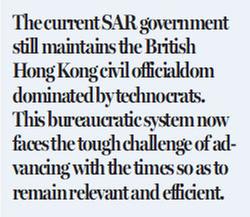Hong Kong now embraces a new era of strong CE

Bob Lee notes Lam's assertive approach marks a shift toward 'executive-led governance' style
Chief Executive Carrie Lam Cheng Yuet-ngor, on her first official visit to Beijing after taking office, told reporters rather matter-of-factly on Tuesday that the Express Rail Link co-location arrangement had gone through years of tinkering, with a lot of attention to its legal basis. It had therefore long passed the point of no return. Acting CE Matthew Cheung Kin-chung also said clearly in Hong Kong that the co-location arrangement is "an absolute must instead of option". That is why what needs to be done is explain and communicate, not a public consultation, he added. "Since it is the only workable arrangement, what good can consultation bring to it?"
Some people complain the government's determination is too much of a "hard sell" but any other interpretation would not be able to change the fact that Lam's moves so far sent a strong signal - her governing style will shift from "positive non-interventionism" to "executive-led governance".

"Executive-led governance" refers to a government philosophy that gives the executive branch slightly more power over the legislature and judiciary for the sake of more efficient policymaking to better serve social development. This mode of governance was not invented by the special administrative region government, in case anyone wondered, but was in fact a product of the British Hong Kong administration, led by the governor. Under the governor-led administrative system the governor enjoyed unitary legitimacy granted by the suzerain through appointment. Under the executive-led governance, meanwhile, the CE's legitimacy is two-fold - through democratic election and central government appointment. In this sense Hong Kong's democratic system constitutes a tangible step forward in governance evolution.
Two weeks ago, Lam took her first overseas trip as CE when she arrived in Singapore on Aug 1, exactly a month after taking office. Her decision to visit Singapore first is definitely significant, considering how similar the two places are and how often people compare them.
Hong Kong and Singapore are indeed similar in several ways: Both are "very small" in size, have adopted the rule of law thanks to British colonial administration and earned the distinction of "Asian Tigers" for achieving "economic miracles" in the second half of the 20th century. However, these two metropolitan entities are quite different when it comes to governing style. The most striking characteristics of Hong Kong's governance has been "positive non-interventionism", adopted by the British Hong Kong government in the 1980s; while Singapore has been under "executive-led governance" ever since it was founded by Lee Kuan Yew, who was berated by the West for almost "dictatorial rule". It is also referred to as "guided democracy".
Singapore's administrative system is based on Britain's Westminster parliamentary democracy but with its own spin to suit Singapore's uniqueness. Despite the government's assertiveness and even brazenness, few deny that Singapore owes its success very much to its obsession with "high efficiency, clean government, limited democracy and economy first". The People's Action Party strongly believes everything it does ultimately serves the best interests of the country. Although that conviction is under constant debate, the great majority of Singaporeans agree the country must maintain its status as one of the most competitive and innovative economies in the world.
Lam said while visiting the Lee Kuan Yew School of Public Policy at the National University of Singapore, where students are trained to become civil servants, that Hong Kong needs its own training facility for public servants. The current SAR government still maintains the British Hong Kong civil officialdom dominated by technocrats. This bureaucratic system now faces the tough challenge of advancing with the times so as to remain relevant and efficient. Therefore a serious question Hong Kong needs to figure out is how its governing proficiency should be improved continuously.
Former CE Leung Chun-ying, Lam's predecessor, suggested many times during his term in office that the SAR government should switch gradually from "positive non-interventionism" to "appropriately proactive". The idea was no doubt his response to almost 20 years of struggles by the SAR government to end its inability to maintain executive-led governance no matter how much it wanted to. There are three main reasons for this sorry situation. One is the independent judiciary; another is the Legislative Council, whose right to amend government bills allows it to undermine the executive branch with filibustering, and still another is the British colonial system of bureaucracy which leaves the CE little room for maneuvering when it comes to executive power control. The accountability system adopted by Hong Kong's first CE, Tung Chee-hwa, was a significant step toward achieving "executive-led governance" but has not been advanced.
Lam's first month in office qualifies as a good start and showed her potential to end the era of "weak CEs" for the SAR government.
The author is executive editor-in-chief of ThinkHK.com, an online publication of the Our Hong Kong Foundation.
(HK Edition 08/14/2017 page8)
Today's Top News
- Selected works of Xi Jinping on rule of law published
- PLA issues warning to Philippines over 'joint patrols' in South China Sea
- Xi's article on developing new quality productive forces to be published
- Beijing protests new US arms sale to Taiwan
- Economic growth in 'upward momentum'
- Strong ties with Thailand stressed































